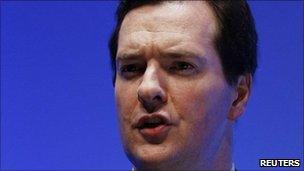Government faces fresh calls for a Plan B
- Published

George Osborne has repeatedly blamed the spending cuts on the previous government
The government has been defending its economic policy after a group of left-wing academics called for a Plan B.
In a letter to the Observer, they described the "breakneck deficit-reduction plan" as "self-defeating".
Foreign Secretary William Hague told the BBC: "Gordon Brown did not leave this country with the luxury of a Plan B or a different economic strategy."
It comes the day before the International Monetary Fund is due to deliver its verdict on the UK economy.
The academics argue, external that government spending cuts are hitting economic growth, which is reducing the amount that the government takes in taxes and increasing the amount it has to pay out in benefits - which increases the budget deficit.
The government has made much of the support for its plans from international financial organisations.
"The government's strategy is endorsed by the IMF, it's endorsed by the OECD, by the G20 and by all the major business organisations in this country," Mr Hague said.
'Disappointing figures'
But last month, while the OECD endorsed the government's policies, its chief economist Pier Carlo Padoan told The Times newspaper that the pace of cuts would have to be slowed if economic growth figures continued to be disappointing.
When the IMF reported on the UK economy in November, it was broadly supportive of the coalition's spending cuts, predicting that the measures to reduce the budget deficit would hit growth, but that the economy would continue to recover.
Since then, it has emerged that the UK economy contracted by 0.5% in the last three months of 2010 and then grew by 0.5% in the first three months of 2011.
"The disappointing figures we've had this week, particularly on manufacturing, seem to be further evidence that the economic recovery is stalling," said shadow chancellor Ed Balls.
"The fact is that the spending review, the decision to cut further and faster than any other major economy and the VAT rise have really knocked business and consumer confidence and are putting at risk the good recovery we were starting to see a year ago."
But Mr Hague argued that changing economic policy now would be dangerous.
"If we wavered for a moment then economic confidence would be reduced and the confidence of the financial markets would be very severely affected, so it is vital to continue on the course that we started," he said.
Jonathan Portes, director of the National Institute of Economic and Social Research, who was chief economist at the Cabinet Office until February, disagreed.
"My view is that actually credibility is jeopardised more by sticking with a plan that isn't working than than it is by changing policy in response to events," he told Sky News.
"I think the government needs to reconsider the pace of fiscal consolidation and consider delaying spending cuts until a time at which the economy is capable of responding to them better."
- Published3 June 2011
- Published26 May 2011
- Published27 September 2010